Feel Left Out at Mexican Family Gatherings Reddit
This study is part of #NBCGenerationLatino, focusing on young Hispanics and their contributions during Hispanic Heritage Month.
Jason Mero, eighteen, headed off to Chocolate-brown Academy this fall proudly staking claim to his Latinx heritage, ever mindful that the sacrifices his immigrant parents fabricated opened the doors of the Ivy League to him.
Born in Queens, New York, to parents who emigrated from Ecuador xxx years ago, Mero would ruminate with his family unit growing upward near the challenges facing an American with Hispanic roots: how to bargain with a more hostile environment against Latinos, and how to affirm his U.S. citizenship, his birthright, while staying continued to his community.
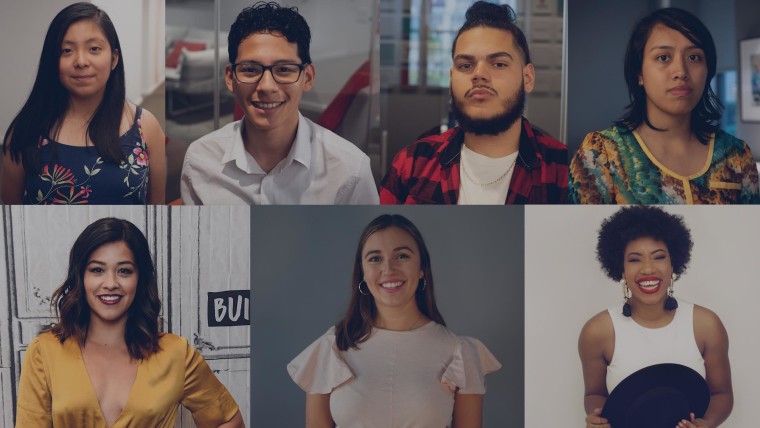
"My family growing up wanted me to stick with my Hispanic roots, but also did not desire me to show those roots to the world outside," Mero told NBC News. "They knew that being Hispanic-American isn't necessarily looked (upon) with a grinning ... in this state. So they were doing that for my rubber and to protect me. But even so, these conversations have shown me that I'one thousand even so proud of being Hispanic, even though it'south being frowned upon past other people."
Ane 1000000 Hispanic-Americans will plough 18 this year and every year for at least the side by side ii decades, said Mark Hugo López, director of global migration and demography research at the Pew Research Heart. That stream of adolescent Latinos coming of age in the U.Due south. started a few years agone and is now gushing.
"This won't be a passing wave," Lopez said, "merely instead an ongoing procedure over the side by side 20 years as the young Latino population enters machismo."
Although percentage-wise Asian Americans are the nation'southward fastest-growing minority group, the Latino population will add together more people each twelvemonth to the U.S. than whatsoever other group for the next few decades, and their median age is younger than Asian Americans, according to Pew Research Heart.
Most of these young Latinos have one affair in common — they were born in the U.s.a..
Nine out of 10 Latinos under xviii are U.S. born.
For those under 35, it's virtually viii in ten, according to new figures from Pew Enquiry Heart.
Over half of Latinos under eighteen and roughly two-thirds of Latino millennials are second-generation Americans — born in the U.Due south. to least one immigrant parent.
"These young Latinos are U.S. built-in, going through U.South. schools," Lopez said, "yet they grew up in Latino households, exposed to the culture of their parents' home country — that is the distinguishing point. They have all the markers of beingness American, yet they are the children of immigrants."
Navigating their parents' immigrant culture while being born and raised in the U.Due south. has shaped their views on identity and what it means to be an American — factors that are, in turn, shaping the nation's developed workforce and electorate.
Juggling language, color, culture
Like other population waves throughout the land's history, these immature bicultural Americans are coming of historic period enmeshed in their Latino and American worlds and trying to carve out a place for themselves in both of them and between.
Berenize García, 16, of New York Urban center, said her father, a Mexican immigrant, has pressured her to exist "more American," while her mother told her it's disrespectful non to retain and speak Castilian to their Mexican relatives.
"That makes me feel confused, because how tin can I exist Mexican when I'thousand pressured to be more than American? How can I be American when I'm pressured to be more than Mexican?" she said.
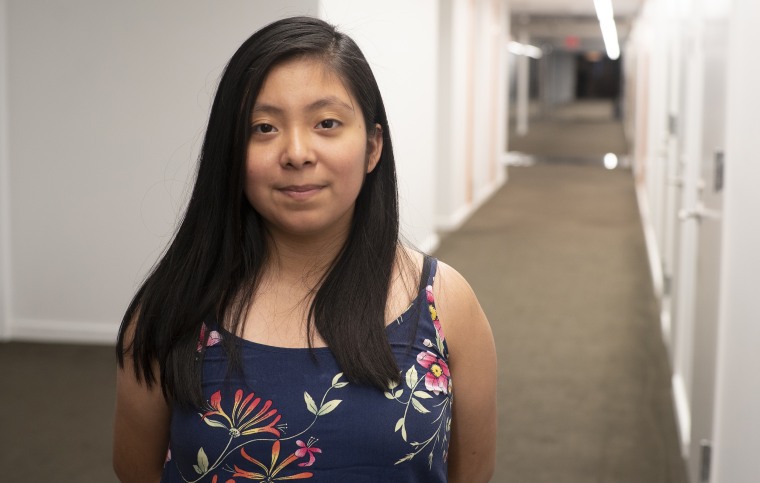
Her defoliation is captured in a scene from the 1997 movie "Selena," in which player Edward James Olmos, playing a father, tells his children how hard it is to be Mexican-American and the nonacceptance that comes from both Mexico and the United States: "Nosotros have to be twice as perfect as everybody else."
These experiences with linguistic communication and culture have imprinted themselves on García and have affected how she sees her hereafter.
"I'm trying to, hopefully, one solar day become a doctor, and in that mode empower my patients who have that language barrier, because my mom, who goes to the medico constantly, tin can't actually express her pain because she doesn't speak English language," García said. "Her pain is brushed off."
While this younger generation of Latinos is more conversant in English than their immigrant parents' generation, three-in-four young Hispanics say they employ Spanish as well, according to Pew.
Toggling between two languages — and that it'southward difficult to be truly bilingual — is mayhap one of the most common threads growing upwards for these immature Latinos.
"Nosotros're stripped in a lot of cases of our Spanish tongue and our Castilian heritage and told information technology's really important that you only speak English and yous know how to speak English well because otherwise, yous're going to face hardship, which is in a lot of ways true because of the prejudice that this land holds," said Alma Flores-Perez, 21, built-in and raised in Austin, Texas.
"But at the same time, I've really come to meet the importance of speaking Spanish or at least trying to claim that as our own and not be aback when yous practise speak Castilian, simply as well not being aback if y'all weren't taught it, because that wasn't necessarily your choice," Flores-Perez said. She thinks her bicultural upbringing is one of the reasons she's majoring in linguistics at Stanford.

Even more than of an impact than linguistic communication, for many young Latinos, is how their skin colour influences how they're perceived, not but by other Americans but by other Hispanic Americans.
Flores-Perez, who is light-skinned, has been questioned when she identifies herself every bit Chicana.
"I've been called whitewashed," said Flores-Perez, who said information technology hurt to not be considered Latina plenty considering of her lite complexion. But she's come to sympathise it's not something she can command.
"I remember I can do my best to project that identity and to make clear who I am and explicate when people ask," she said.
Christopher Robert, 18, of Brooklyn, whose female parent is Dominican and male parent is Puerto Rican, said, "There are a lot of people in my family who take a nighttime pare tone, but all the same, like, insist that they're part of a white Latino population."
Robert, who describes himself as Afro-Latino, added, "I cull to acknowledge it and accept information technology as part of who I am."
Leyanis Díaz, 25, is an Afro-Latina blogger and entrepreneur based in Miami who was built-in in Republic of cuba and came to the United States with her family when she was iii.
"I had people tell me they didn't even know that there were black people in Cuba, which fabricated me really feel ...," she said pausing. "Information technology gave me self-esteem issues, for the most part."

That didn't finish her from entering, and winning, the Miss Black Florida United states of america pageant last yr. "In all honesty, the style I've combated these stereotypes is by continuing to brainwash non only my friends, but the people that I encounter —educating them almost Cuba, where I come up from, teaching them more than about my culture," Díaz said.
Many young Latinos see themselves as in-between skin colors and races.
Jeanette Garzón Terreros, 18, a freshman at Columbia, said that when she's filled out sure forms, she has left blank the questions on race or ethnicity.
"I don't identify every bit white, I don't place as black, I don't place as any of the things, and they don't put an 'other,'" she said. Garzón Terreros said she saw a movie of the part of United mexican states that her parents are from, and the people looked part indigenous, part Castilian. "It'south like the mix between the two races."
Experiences shape their outlook
Beyond issues of language and color, living amid their immigrant parents and their extended network has influenced how young Latinos come across bug in the U.S. and beyond.
Some recounted, amongst smiles, growing up as Latinos while not necessarily embracing their families' traditions. "I don't dance; salsa, nothing," said Christopher Robert. "I don't know how to cook Dominican food or anything."
More seriously, they spoke of the pressure their parents felt to help relatives in their home countries, despite not having much more money themselves.
They also spoke of having to explain their identity non just in their U.S. neighborhoods, but in their parents' home countries, to family members who questioned their accents or condition based on their U.S. experience.
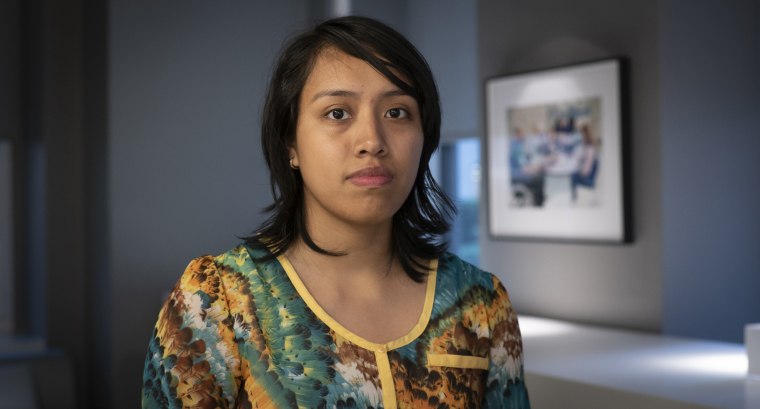
Here at home, U.S.-built-in young Latinos too grow upward with the reality that depending on their family or friends' immigration status, they could one day exist taken past clearing enforcement officers, held in detention for long periods and possibly deported.
With community if not familial ties to immigrants — including legal residents without documents and people with deportation deferrals — detentions and deportations or the fear of them are part of immature Latinos' daily lives.
Flores-Perez said she was "really rocked" when President Donald Trump brought upward trying to rescind the DACA program, Deferred Activeness for Child Arrivals, which allowed undocumented young people brought to the U.S. as children to remain in the land.
Her best friend, from Republic of honduras, was a DACA educatee. "I was terrified, and she was terrified because she's been here since she was 2 years old. This country is all she knows," said Flores-Perez.
A survey of millennials released in Jan found that 49 percentage of millennial Latinos worried a lot that a family member or close friend could be deported, compared to 25 per centum of Asian Americans and 21 percent of African-Americans. White millennials' experience was the polar reverse to Latinos: Fifty percent said they did not know anyone at take a chance of being deported.
Young adults nether 35 are already the most diverse generation in U.S. history, according to Stella Rouse, a Academy of Maryland political scientist. The diversity has establish its way into politics and policy making and is likely to give a singled-out shape to how the country addresses major issues.
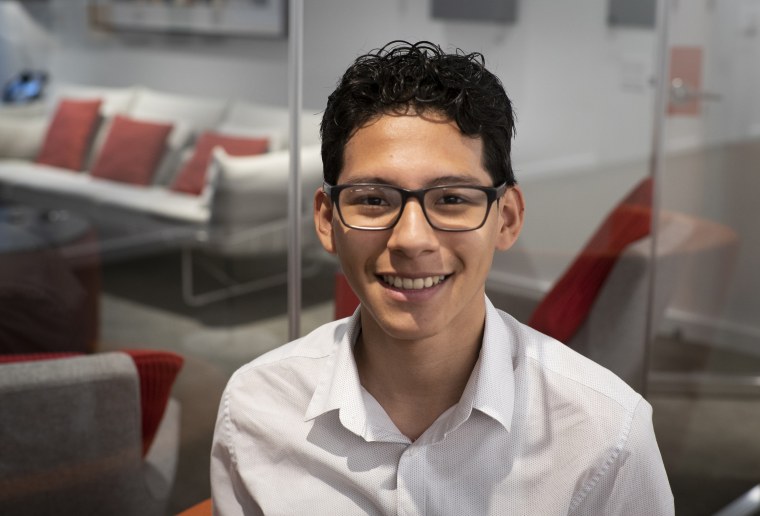
In her new book, "The Politics of Millennials" — written with Ashley D. Ross, an assistant professor at Texas A&Grand University — Rouse argues that millennials' diverseness, combined with growing up amid the Sept. 11, 2001, terrorist attacks, the Cracking Recession and the debate over clearing, "merely guides a lot of attitudes and policy preferences." This includes their views on the economic system, the role of government in providing opportunities and how to deal with a lack of access to health insurance.
Rouse sees the influence of diversity and upbringing in immature Latinos' attitudes toward climate modify, for example.
The share of Latino millennials who believe climate modify is occurring is about 49 percent points college than white millennials and twenty pct points college than African-Americans.
Young Latinos may be disproportionately affected by climate modify considering where they live, how many of them or their families are employed in the agricultural manufacture and that they have relatives in other countries that have experienced climate-related bug, Rouse said.
Challenges and opportunities
As with every generation, a young person's trajectory is eventually tied not just to their prosperity just to the land's economic success. When looking at the nation's Latino youth, there are challenges and there are opportunities, according to Pew Research's López.
On the ane hand, a record number of immature Latinos, 3.6 million in 2016, are attending college, and their share is growing, according to Pew. Additionally, 67 percent of Latinos ages 25 and older had earned a high school degree.
Nonetheless they lag backside other groups in pursing higher education. Just 17.ii percent of Hispanic adults take a available's degree and v percent an advanced degree, compared to 38.1 percentage and 14.iii percent of non-Hispanic whites, according to the Hispanic Association of Colleges and Universities.
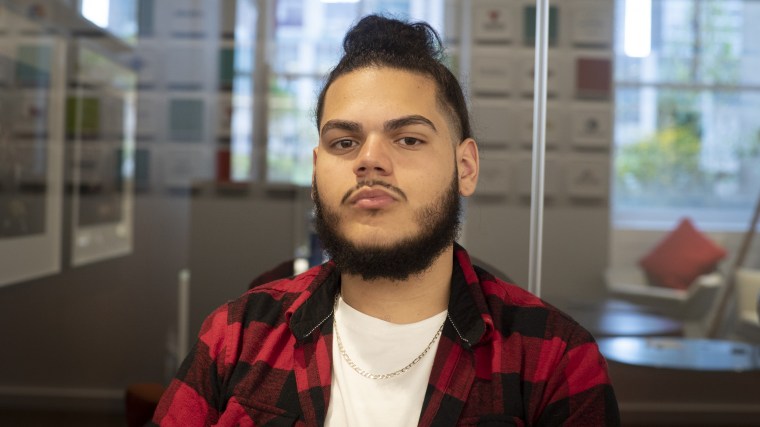
One of the biggest issues is higher costs, complicated by the fact that Latino families, which generally started the Great Recession with less net worth than other indigenous groups, lost 66 percent of their household wealth during this period.
"I'm at Northeastern right at present — I'g only hither because there was a good financial assist package, and even and so it was extremely expensive," said Robert, the Brooklyn teen. "Earlier I made my conclusion, I sat downwardly with my mom and asked her, 'Are you sure yous want to exercise this?'"
Despite financial odds, immature Latinos are greatly optimistic. More than three-in-iv Hispanics ages 18-35 say nigh people who desire to get ahead will be able to make it if they piece of work hard.
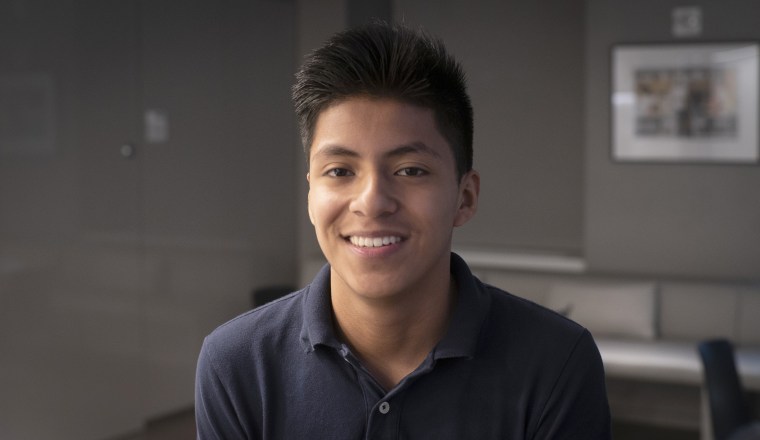
Marco Garcia is Berenize'due south twin brother. He described their immigrant parents' difficult work. "My dad works half-dozen days a week from x to 10," Marco said. "My mom works every bit a housemaid, scrubbing floors, cleaning bathrooms and what not."
When they were younger, Marco was embarrassed past his parents' broken English when they came to school functions. At present he and his sister, students at Uncommon Charter High School in Brooklyn, see it as a point of pride that they're children of immigrants — as well equally high achieving students.
"I feel very optimistic about the futurity," Berenize said. "Our parents already did the majority of the piece of work. All we've got to do is just finish information technology."
FOLLOW NBC LATINO ON FACEBOOK, TWITTER AND INSTAGRAM.
Source: https://www.nbcnews.com/news/latino/young-latinos-born-u-s-carving-their-own-identity-n908086
0 Response to "Feel Left Out at Mexican Family Gatherings Reddit"
Post a Comment